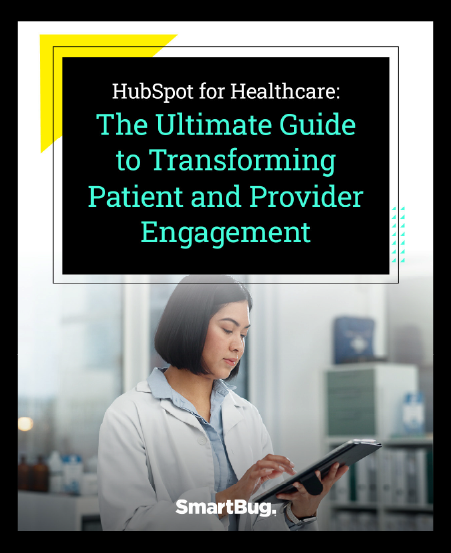.png?width=1920&height=720&name=hs-for-healthcare-2%20(1).png)
HubSpot for Healthcare: The Ultimate Guide to Transforming Patient and Provider Engagement
Healthcare organizations face growing pressure to deliver seamless, personalized experiences while managing complex operations and compliance requirements. This guide explores how HubSpot streamlines patient and provider engagement, improves efficiency, and drives better outcomes.
Download a PDF version of this guide by filling out this form, or keep scrolling to learn more.

Chapters
Introduction to HubSpot for Healthcare
What Is a Healthcare CRM and Why Does It Matter?
Top CRM Challenges Healthcare Organizations Face
How HubSpot Solves These CRM Challenges
The Best HubSpot Tools for Healthcare Organizations
Integrating HubSpot with Your Healthcare Tech Stack
Real-World Case Studies: Healthcare Companies Winning with HubSpot
Why SmartBug Media Is the Leading HubSpot Partner for Healthcare Organizations
Getting Started with HubSpot for Healthcare
- Introduction to HubSpot for Healthcare
- What Is a Healthcare CRM and Why Does It Matter?
- Top CRM Challenges Healthcare Organizations Face
- How HubSpot Solves These CRM Challenges
- The Best HubSpot Tools for Healthcare Organizations
- Integrating HubSpot with Your Healthcare Tech Stack
- Real-World Case Studies: Healthcare Companies Winning with HubSpot
- Why SmartBug Media Is the Leading HubSpot Partner for Healthcare Organizations
- Getting Started with HubSpot for Healthcare
- Download
Introduction to HubSpot for Healthcare

Patient expectations have fundamentally changed, shaped by the personalized experiences they encounter in retail, hospitality, and other consumer-centric industries. They expect healthcare providers to offer easy scheduling, responsive communication, and tailored care journeys that build trust, nurture referrals, and improve health outcomes.
And yet, many healthcare organizations still struggle with disconnected technology—one platform for patient scheduling, another for billing, and separate tools for marketing and outreach. Staff spend hours reconciling fragmented patient information across platforms, providers face gaps in critical patient data, and frontline teams become bogged down by manual processes. This fragmentation not only frustrates patients and providers but also introduces compliance concerns, putting healthcare organizations at greater risk of HIPAA violations due to mishandled protected health information (PHI).
HubSpot for healthcare solves these issues by centralizing patient, provider, and referral data into a single, intuitive customer relationship management (CRM) platform. By connecting marketing, sales, and service teams, HubSpot provides real-time visibility into every patient and provider interaction.
With a unified view across the entire patient journey, healthcare teams can personalize communications, streamline workflows, and ensure regulatory compliance—all while maintaining productivity. And with 70 percent of healthcare executives prioritizing operational efficiency and productivity gains this year, optimizing workflows has never been more critical.
What Is a Healthcare CRM and Why Does It Matter?

A healthcare CRM is a software platform specifically designed to help healthcare organizations manage relationships with patients, providers, referral networks, and stakeholders in one centralized place. Unlike traditional CRMs, healthcare CRMs are built to manage complex relationships and regulatory requirements unique to healthcare. A robust healthcare CRM helps organizations:
- Segment and personalize patient and provider interactions: Tailor outreach based on patient demographics, conditions, appointment history, and communication preferences.
- Track referrals and provider relationships: Capture detailed interactions and referral sources to optimize provider engagement and streamline referral processes.
- Maintain compliance and protect sensitive data: Manage patient consent, track communication permissions, and ensure secure, auditable management of PHI in alignment with HIPAA guidelines.
- Automate patient engagement: Deliver timely reminders, educational content, and follow-ups through automated workflows, reducing administrative burden and enhancing patient adherence.
Healthcare CRMs differ from generic CRMs by incorporating mandatory compliance features—such as advanced permissions, audit logging, and encryption—to manage sensitive data according to HIPAA regulations. HubSpot’s healthcare CRM provides these essential capabilities, combining flexible customization with built-in HIPAA compliance to help healthcare organizations better manage patient relationships, streamline workflows, and improve outcomes at every step.
Top CRM Challenges Healthcare Organizations Face

Healthcare organizations face significant challenges when they rely on disconnected or generic CRMs not built for healthcare-specific workflows. These challenges impact patient experience, operational efficiency, and regulatory compliance—key drivers of organizational success.
Compliance Risks
Generic CRMs often lack the security controls needed to protect PHI, increasing the risk of data breaches, compliance violations, and reputational harm. Without features such as audit logging, advanced encryption, and automated consent management, organizations struggle to maintain HIPAA compliance.
Manual data handling across disconnected systems further heightens the risk of errors and unauthorized access. A healthcare CRM mitigates these risks by embedding compliance into its core, ensuring secure data management and reducing the possibility of costly penalties.
Fragmented Systems and Data Silos
A recent Healthcare Information and Management Systems Society (HIMSS) survey revealed that 57 percent of physicians identify interoperability as their primary obstacle in maximizing health IT. When critical patient information—such as appointment histories, communication records, or referral details—exists in isolated systems, healthcare teams lack the unified view required to deliver efficient, personalized care.
Disconnected systems lead to repeated administrative tasks, delayed provider communications, and disjointed patient experiences. Staff often spend significant time manually reconciling data between platforms, diverting valuable hours from patient care and relationship management.
Centralized CRM solutions tailored specifically for healthcare workflows solve these issues by integrating multiple platforms—such as electronic health records (EHRs), billing software, telehealth tools, and marketing systems—into one accessible, cohesive system.
Long, Complex Sales Cycles
Healthcare sales cycles typically involve multiple clinical, financial, and operational stakeholders. Generic CRM platforms typically aren't designed for multi-stakeholder engagement or lengthy sales cycles, which can span several months or even years.
To effectively manage lengthy sales cycles involving multiple departments, healthcare teams need a CRM that captures detailed stakeholder conversations, tracks specific regulatory milestones, and automates follow-up tasks. Without these capabilities, organizations risk stalled deals, miscommunications, or lost opportunities as sales teams struggle to maintain continuity and clarity across interactions.
Misalignment Between Teams
When marketing, sales, and service departments rely on separate systems, critical patient and provider insights become siloed, limiting visibility into the complete patient journey. For instance, marketing teams may collect consent and communication preferences, but if this information isn’t shared with service teams, it can lead to non-compliant patient interactions or missed engagement opportunities.
Unified CRMs break down these silos, giving every team clear access to patient data, interaction history, and consent details. This alignment ensures teams operate from the same information, creating more cohesive patient communications and significantly improving organizational efficiency.
Addressing these common challenges requires a CRM built specifically with healthcare workflows in mind—which is where HubSpot excels.
How HubSpot Solves These CRM Challenges

Effectively addressing CRM challenges in healthcare demands a platform specifically built to handle sensitive patient information, complex provider relationships, and strict compliance standards. HubSpot meets these demands by centralizing data, automating critical healthcare workflows, and giving teams clear visibility into patient and provider journeys.
HIPAA Compliance and Secure Data Management
HubSpot provides built-in compliance tools to securely manage PHI, including robust encryption, detailed audit logging, and role-based permissions. These features empower healthcare organizations to confidently handle sensitive data within HubSpot, mitigating potential HIPAA violations and data security issues.
To further strengthen security, healthcare teams can configure HubSpot to:
- Manage patient consent and opt-out preferences directly in the CRM.
- Automatically trigger alerts for potential data access or compliance issues.
- Create audit trails that document all interactions involving PHI, ensuring transparency and accountability across every patient and provider touchpoint.
Unified Patient and Provider Data Management
HubSpot consolidates patient, provider, and referral partner data into one location, making critical information immediately accessible. This unified record provides comprehensive visibility into every patient and provider interaction—from initial inquiry and referral to ongoing care and follow-up.
With HubSpot, healthcare teams can:
- Personalize patient communications based on detailed interaction histories and care milestones.
- Coordinate seamless handoffs between marketing, clinical, and administrative teams, eliminating friction caused by disconnected systems.
- Track referral patterns, provider engagement, and patient journeys with clear, real-time insights.
Personalized, Automated Patient and Provider Journeys
HubSpot’s powerful automation and segmentation tools allow healthcare teams to deliver personalized patient journeys at scale. Organizations can design automated workflows triggered by patient or provider interactions, such as scheduled appointments, missed visits, or referral activities.
For example, healthcare teams can leverage HubSpot automation to:
- Automatically send appointment reminders via email or SMS.
- Provide timely educational resources based on care plans or conditions.
- Trigger proactive patient follow-ups or provider check-ins, increasing engagement while reducing administrative effort.
Customizable Pipelines for Complex Healthcare Sales Cycles
Healthcare sales processes often require engaging multiple decision makers with distinct timelines, priorities, and evaluation criteria, including clinical directors, CFOs, and IT leaders. HubSpot allows teams to build highly customized pipelines tailored to healthcare scenarios, including patient onboarding, provider engagement, or multi-step payer negotiations.
HubSpot’s custom pipelines enable healthcare sales teams to:
- Document interactions with diverse stakeholders, capturing critical information such as care specialties, payer types, and referral sources.
- Track sales milestones unique to healthcare, from provider onboarding to complex MedTech implementations.
- Automate targeted follow-ups to maintain momentum throughout lengthy sales cycles, ensuring consistent stakeholder engagement without manual overhead.
Healthcare-Specific Reporting and Analytics
HubSpot’s analytics capabilities are designed to provide actionable insights specific to healthcare KPIs—such as patient retention, referral source effectiveness, and marketing campaign ROI. Detailed reports and dashboards help healthcare organizations clearly understand how patient relationships, provider engagements, and outreach strategies contribute to growth and operational efficiency.
With healthcare-specific reporting, teams gain visibility into:
- Patient and provider acquisition trends, enabling more targeted marketing and sales strategies.
- Referral patterns and provider engagement, empowering teams to optimize referral network management.
- Campaign performance across channels, clearly attributing results to individual marketing and sales activities.
Seamless Integrations with Healthcare Systems
HubSpot integrates seamlessly with essential healthcare technology, reducing administrative workload and ensuring data accuracy and compliance. When HubSpot connects to other systems, teams can achieve automated workflows, fewer communication errors, and enhanced compliance across patient interactions.
The Best HubSpot Tools for Healthcare Organizations

HubSpot’s integrated suite—Marketing Hub, Sales Hub, Service Hub, and Operations Hub—equips healthcare organizations to manage patient and provider relationships with greater efficiency, clarity, and compliance. Each Hub can be tailored specifically to healthcare workflows, allowing teams to deliver personalized, scalable experiences across every patient interaction.
HubSpot Marketing Hub
Marketing Hub enables healthcare teams to tailor compliant communications and campaigns targeted to patient and provider segments.
Marketing Hub helps your team:
- Enhance patient communication: Automate outreach that adapts based on patient profiles, treatment plans, or provider specialties—without manual intervention.
- Nurture potential leads: Deliver timely content based on referral activity, patient interests, or care milestones, strengthening relationships and increasing patient acquisition.
- Leverage content marketing: Deploy targeted content marketing strategies that attract qualified patients and providers, clearly positioning the organization as a trusted expert.
- Assess campaign performance: Use multi-touch attribution reports to measure campaign effectiveness and ROI, enabling strategic allocation of marketing resources.
HubSpot Sales Hub
Sales Hub streamlines complex healthcare sales processes, enabling sales and business development teams to effectively manage long, multi-stakeholder sales cycles, provider onboarding, and referral partnerships.
Sales Hub empowers healthcare teams to:
- Track complex stakeholder interactions: Document detailed conversations with clinical, financial, and operational decision makers, ensuring context is always accessible and complete.
- Manage custom healthcare pipelines: Create customized sales pipelines for scenarios such as payer negotiations, MedTech product implementations, or provider onboarding workflows, clearly capturing healthcare milestones.
- Automate targeted follow-ups: Trigger tailored communications based on specific events, such as completed referrals or proposal updates, to sustain engagement without adding manual tasks.
HubSpot Service Hub
Service Hub streamlines patient support and provider interactions by centralizing communication, automating responses, and gathering real-time feedback. These capabilities help healthcare organizations deliver consistent, responsive patient experiences at scale.
With Service Hub, healthcare teams can:
- Centralize patient inquiries: Automatically route tickets (e.g., appointment requests, billing issues, clinical questions) to the right teams for faster resolution.
- Offer self-service support: Implement AI-powered chatbots and searchable knowledge bases, enabling patients and providers to access answers regardless of time or location.
- Collect actionable feedback: Automate post-visit surveys to capture timely patient and provider satisfaction data, driving continuous service improvement.
HubSpot Operations Hub
Operations Hub helps healthcare teams maintain clean, reliable patient data and automate compliance workflows. By integrating seamlessly with healthcare platforms, Operations Hub ensures consistent, secure patient data management across systems.
Healthcare teams leverage Operations Hub to:
- Integrate with existing healthcare tools: Create reliable connections with EHRs, telehealth platforms, and billing systems to synchronize patient and provider data across the entire tech stack.
- Automate data cleanup: Identify and eliminate duplicate, incomplete, or inaccurate data, protecting data integrity and compliance.
- Streamline compliance workflows: Automate processes around patient consent tracking, HIPAA compliance audits, and privacy alerts, ensuring data security without manual administrative oversight.
Integrating HubSpot with Your Healthcare Tech Stack

For healthcare organizations, the effectiveness of a CRM hinges on how smoothly it integrates with existing technologies. HubSpot’s flexibility allows seamless connections with EHRs, telehealth platforms, medical billing systems, and scheduling tools, creating a unified view of patient and provider interactions without the burden of manual data entry.
Connecting HubSpot with Electronic Health Records
EHR systems, such as Athenahealth, Epic, and Meditech, contain essential clinical and administrative patient data. Integration bridges clinical data with marketing, sales, and service, providing consistent, accurate patient information across all teams.
By integrating HubSpot and your EHR, your organization can:
- Automatically synchronize patient demographics, care history, and appointment records, providing marketing and sales teams real-time visibility into patient interactions.
- Streamline patient handoffs between clinical and administrative teams, eliminating communication gaps that could negatively impact patient care or compliance.
- Ensure consistent, compliant messaging based on accurate clinical data, enhancing both patient experiences and operational efficiency.
Integrating Telehealth Platforms and Patient Portals
Telehealth platforms and patient portals are essential to deliver convenient, ongoing patient engagement. Integrating these technologies into HubSpot extends your visibility into virtual interactions, ensuring seamless patient experiences regardless of care delivery channel.
With telehealth and patient portal integration, healthcare teams are empowered to:
- Capture telehealth session details directly within HubSpot, automatically triggering appropriate follow-ups, educational content, or satisfaction surveys.
- Log patient portal interactions in real time, ensuring administrative and clinical staff have a complete picture of patient engagement, appointments, and inquiries.
- Personalize outreach based on patient activity within the telehealth platform or patient portal, allowing for more targeted and effective communications.
Integrating Medical Billing and Scheduling Software
Billing and scheduling systems drive critical patient interactions, from appointment reminders to financial follow-ups. By integrating these platforms with HubSpot, healthcare organizations can automate key workflows, reducing manual processes and enhancing patient communication.
Integration with billing and scheduling software enables your team to:
- Automatically update HubSpot records based on appointment confirmations, cancellations, or rescheduling, triggering timely patient communications.
- Monitor patient financial statuses, enabling targeted follow-ups based on outstanding balances, payment history, or insurance status directly within HubSpot.
- Automate billing-related notifications, such as overdue balance reminders, payment plan updates, or insurance verifications, minimizing administrative overhead and improving patient satisfaction.
Leveraging AI-Driven Automation with Breeze AI
SmartBug Media further enhances HubSpot’s capabilities through Breeze AI—an advanced, AI-powered solution. Breeze AI automates provider outreach based on past behaviors, clinical history, or care milestones.
Using Breeze AI within HubSpot, healthcare organizations can:
- Proactively identify disengaged or at-risk patients, automatically triggering re-engagement workflows to improve adherence and satisfaction.
- Reduce manual administrative tasks, such as appointment follow-ups, patient reminders, or educational outreach, enabling staff to spend more time on high-value patient interactions.
- Ensure compliant outreach at scale, maintaining consistency across patient touchpoints without sacrificing efficiency or security.
Real-World Case Studies: Healthcare Companies Winning with HubSpot

Healthcare organizations across specialties have successfully leveraged HubSpot to streamline operations, improve patient and provider engagement, and maintain rigorous compliance standards. Below are powerful real-world examples illustrating the measurable impact of adopting HubSpot.
Potomac Psychiatry
Enhancing Patient Engagement with an AI-Powered Agent
Challenge
Potomac Psychiatry sought to improve connections with prospective patients by addressing challenges in lead qualification and conversion. The practice needed a solution that could engage empathetically with potential patients, effectively qualify leads, and streamline the appointment booking process—all while ensuring HIPAA compliance.
Solution
SmartBug Media collaborated with Potomac Psychiatry to develop Dr. Holo, an AI-powered virtual agent integrated into its website. Leveraging GPT-4 technology, Dr. Holo engages visitors in personalized conversations, provides relevant information, qualifies leads through targeted questions, and guides them toward appropriate care. The agent also facilitates direct appointment bookings and payment collections, ensuring a seamless and secure process.
Results
The implementation of Dr. Holo led to significant improvements in patient engagement and operational efficiency:
- Enhanced engagement: Site engagement time increased by 139 percent, with a 115 percent rise in conversations with Dr. Holo within three months.
- Stronger referrals: Professional referrals grew by 123 percent, as referral partners utilized Dr. Holo to assess patient suitability.
- Improved conversions: The rate of inquiries converting to booked appointments increased by 50 percent, with 45 percent of users confirming appointments within 24 hours.
These outcomes demonstrate how integrating an AI-powered agent like Dr. Holo can transform patient engagement, streamline operations, and enhance overall mental healthcare delivery.
Juno Health
Streamlining CRM Processes to Enhance Sales and Marketing
Challenge
Juno Health, a healthcare technology company specializing in EHR software solutions, faced significant challenges with data inconsistencies and inefficiencies within its CRM. The disjointed CRM setup hindered effective sales and marketing operations, leading to fragmented records and a lack of streamlined workflows.
Solution
SmartBug Media partnered with Juno Health to conduct a comprehensive audit and overhaul of its CRM. The initiative focused on cleaning up duplicate records, standardizing sales data, and fully integrating platform processes. SmartBug also facilitated complete adoption of HubSpot across the sales and marketing teams, implementing contact record must-haves and developing a sales enablement playbook to guide future operations.
Results
The CRM cleanup and process standardization led to significant improvements:
- Enhanced data accuracy: Numerous duplicate contact and company records were removed, ensuring a healthy and accurate database for sales and marketing efforts.
- Full platform adoption: The company achieved 100 percent adoption of HubSpot usage across sales and marketing teams, complete with KPI monitoring tactics to measure performance.
- Newfound efficiency: Streamlined sales processes and organized lead and pipeline data paved the way for effective marketing initiatives and data-driven decision-making.
This foundational work inside HubSpot enabled Juno Health to harness its data more effectively, setting the stage for a fruitful long-term marketing partnership.
Clevens Face & Body Specialists
Boosting Online Presence and Engagement
Challenge
Clevens Face & Body Specialists, a cosmetic surgery practice in Melbourne, Florida, sought to enhance its online presence to attract more qualified leads and improve patient engagement. The practice faced challenges with an outdated website, limited content, and fragmented marketing efforts, hindering its ability to connect with potential patients.
Solution
SmartBug Media partnered with Clevens Face & Body Specialists to implement a comprehensive inbound marketing strategy. This included developing a new website using the HubSpot CMS, creating premium content, optimizing for search engines, and implementing lead nurturing and segmentation strategies. The goal was to provide valuable information to prospective patients, build trust, and guide them through their decision-making process.
Results
The collaboration led to significant improvements:
- Increased organic traffic: The practice experienced a 500 percent increase in organic traffic, attracting more potential patients to the website.
- Growth in monthly leads: There was a 400 percent increase in new monthly contacts, expanding the practice's reach and potential client base.
- Rise in consultation requests: Monthly consultation requests increased by 302 percent, leading to higher patient acquisition rates.
These outcomes demonstrate the effectiveness of a tailored inbound marketing strategy in enhancing online presence and patient engagement for healthcare practices.
Why SmartBug Media Is the Leading HubSpot Partner for Healthcare Organizations
.png?width=1920&height=720&name=hs-for-healthcare-3%20(1).png)
Implementing a healthcare CRM requires specialized expertise in patient privacy, provider relationships, and compliance. SmartBug Media specifically configures HubSpot to meet these healthcare requirements.
Deep Healthcare Industry Expertise
SmartBug’s dedicated healthcare team understands the operational, regulatory, and patient-engagement nuances faced by organizations across the healthcare sector, including:
- Providers and specialty medical groups
- Healthcare SaaS and MedTech companies
- Senior living and home health organizations
- Healthcare-focused private equity firms
- And other companies with a healthcare focus
This extensive experience allows SmartBug to tailor each HubSpot implementation precisely to your organization’s needs and compliance requirements, ensuring maximum impact with minimal disruption.
Specialized HubSpot Configuration and Integrations
As a HubSpot Elite Partner, SmartBug customizes HubSpot specifically for healthcare processes, including advanced pipeline setup, secure integrations with existing healthcare tech, compliant outreach automation, and role-based data security:
- Advanced pipeline customization to clearly manage healthcare-specific sales and onboarding cycles.
- Secure integration with existing healthcare platforms, including EHRs, telehealth solutions, medical billing, and scheduling systems.
- Automated, compliant patient and provider outreach workflows that reduce manual work and enhance patient engagement without sacrificing regulatory compliance.
- Role-based data access and security configurations that ensure rigorous compliance with HIPAA and related privacy regulations.
Commitment to Compliance and Data Security
Protecting sensitive patient data is essential for maintaining regulatory compliance and building patient trust. SmartBug builds HIPAA compliance into every stage of your HubSpot implementation by:
- Implementing robust data encryption, role-based permissions, and detailed audit logs to ensure all patient interactions remain compliant and secure.
- Automating patient consent and opt-out management processes directly within HubSpot, minimizing risk and ensuring compliance with HIPAA and GDPR.
- Conducting regular compliance audits and providing proactive guidance to ensure ongoing alignment with evolving regulatory standards.
Continuous Optimization and Ongoing Support
Your organization will evolve—and your CRM should evolve with it. SmartBug’s support extends beyond initial implementation, providing:
- Regular CRM health checks to monitor performance, compliance, and data accuracy, making proactive improvements as your organization grows.
- Periodic workflow optimizations in response to changes in patient needs, provider networks, or regulatory landscapes.
- On-demand training and resources to ensure your team stays current with HubSpot best practices, new features, and compliance requirements.
Healthcare organizations choose SmartBug for its deep understanding of healthcare complexity and proven ability to deliver strategic, compliant, and scalable HubSpot implementations.
Getting Started with HubSpot for Healthcare

Implementing HubSpot effectively in your healthcare organization requires careful planning, strategic customization, and ongoing optimization to ensure compliance and operational efficiency. A structured process will help your organization successfully adopt HubSpot to enhance patient and provider engagement:
1. Assess Current CRM Gaps
Start by evaluating your current systems to pinpoint specific gaps or inefficiencies in patient and provider relationship management, compliance adherence, and workflow automation. Your assessment should address:
- Data management: Are patient and provider records centralized or fragmented across multiple platforms?
- Departmental alignment: Do marketing, sales, and service teams have a shared, accurate view of patient and provider interactions?
- Manual bottlenecks: Which manual processes consume staff time and could benefit from automation?
- Compliance risks: Where are the greatest risks related to managing patient consent, PHI, or regulatory reporting?
This evaluation clarifies how HubSpot can address your organization’s most critical needs.
2. Clearly Define Your Engagement Goals
Based on your gap assessment, define measurable goals for patient and provider engagement. Common healthcare CRM goals include:
- Reducing patient no-shows through automated reminders and follow-ups.
- Increasing provider referrals by simplifying referral management and communication.
- Improving patient adherence with tailored, automated educational resources.
- Boosting new patient acquisition and retention rates through targeted, compliant marketing campaigns.
Having clear objectives ensures your HubSpot implementation aligns directly with your organizational priorities.
3. Customize HubSpot for Healthcare Workflows
With clearly defined goals, tailor HubSpot to match your healthcare workflows and compliance requirements. Key customization tasks include:
- Creating healthcare-specific contact properties, such as patient status, referral source, payer type, and care plans.
- Designing automated workflows for tasks such as appointment scheduling, provider referrals, billing follow-ups, and post-care outreach.
- Implementing detailed segmentation for targeted communications based on care plans, provider specialties, or patient demographics.
- Setting up secure data management processes, including role-based permissions, audit trails, and consent management.
4. Train Your Teams on Healthcare CRM Best Practices
Effective implementation depends on how well your teams adopt HubSpot’s capabilities. SmartBug recommends comprehensive, role-specific training sessions that address:
- Consistent, compliant documentation practices for PHI and patient consent.
- Effective use of automation to reduce administrative burden without losing personalization.
- Proper tracking of patient and provider interactions to maintain continuity and ensure accurate reporting.
- Regular updates and training refreshers to stay current with HubSpot’s latest features, compliance requirements, and industry best practices.
5. Continuously Optimize Your HubSpot Environment
With ongoing updates to HIPAA regulations, expanding telehealth requirements, and growing patient expectations for real-time digital communication, healthcare organizations must regularly adapt their processes. Regular optimization includes:
- Periodic performance and compliance audits to proactively identify and address potential gaps or opportunities.
- Workflow updates in response to changes in service lines, patient expectations, or provider networks.
- Regular training updates for staff as new HubSpot capabilities or regulatory changes emerge.
6. Partner with Healthcare CRM Experts
A successful HubSpot implementation for healthcare requires specialized knowledge and ongoing strategic guidance. Partnering with a healthcare CRM expert, like SmartBug Media, helps ensure your implementation is secure, compliant, and continuously optimized, enabling your team to focus on providing exceptional patient care and service.
Download a PDF version of this guide by filling out the form



.jpg?width=450&length=450&name=Healthcare%20Marketing%20Strategies%20to%20Increase%20Consultations%20(1).jpg)







